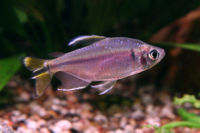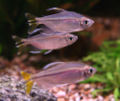Yellow-Tailed Congo Tetra (Alestopetersius caudalis)
From The Aquarium Wiki
(Redirected from Hemigrammopetersius caudalis)
Yellow-Tailed Congo Tetra
Alestopetersius caudalis
95 Litres (25 US G.)
6.4-7.6cm (2.5-3 ")
Freshwater
6.5 - 7.8
22 -26 °C (71.6-78.8°F)
10-20 °d
1:2 M:F
8-10 years
Family
Alestidae
Contents
Additional names
- Yellow-Tailed Congo Tetra, Yellowtail Tetra, Yellowfin Congo Tetra, Yellow Fin Tetra, Blue Congo Tetra
Additional scientific names
- Petersius caudalis, Phenacogrammus caudalis, Petersius brumpti, Hemmigrammopetersius brumpti, Phenacogrammus xennurus, Alestopetersius hilgendorfi grandi, Alestopetersius leopoldianus brumpti, Alestopetersius xenurus xenurus, Hemigrammopetersius caudalis, Hemigrammopetersius xenurus, Micralestes grandi, Petersius xenurus, Phenacogrammus leopoldianus brumpti, Phenacogrammus xenurus
Sexing[edit]
- Females are smaller than males and do not have the white coloured edges at the fins that males have. Females also lack the black extended middle section of the caudal fin.
Tank compatibility[edit]
- A generally peaceful Tetra that does best kept in groups of 6 or more. May nip at other fish so should not kept with slow-moving long finned fish such as Angelfish, and as they themselves have fairly long finnage they should also not be kept with known nippers such as Tiger Barbs.
Diet[edit]
- Will accept most foods including pellet and flake food as well as live/frozen food such as brine shrimp and daphnia.
Feeding regime[edit]
- Feed once or twice a day.
Environment specifics[edit]
- Prefers a densely planted tank with some open swimming space. The tank should stay in a quiet environment and the fish appreciate hiding places.
Behaviour[edit]
- The A. caudalis is an active shoaling fish. They are skittish fish, and are shy and easily disturbed by movements outside the aquarium.
Identification[edit]
- An exceptionally attractive Tetra with a similar body shape to the more commonly seen Congo Tetra. Their body is pale but exhibits iridescence under the right lighting conditions. The dorsal part can show blue reflections while the sides of the body reflect light with hues of yellow and silver. Their caudal fin is elongated and striking yellow in colour giving them their common name. All other fins are translucent with luminous blue-white edging.
Pictures[edit]
External links[edit]
- Fishbase (Mirrors: Error creating thumbnail: Unable to save thumbnail to destination)



